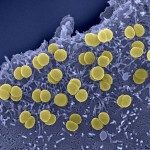Lien vers Pubmed [PMID] – 37370311
Lien DOI – 10.3390/antibiotics12060992
Antibiotics (Basel) 2023 Jun; 12(6):
Beta-lactams are the main antibiotics for the treatment of invasive meningococcal disease. However, reduced susceptibility to penicillin G is increasingly reported in Neisseria meningitidis and reduced susceptibility to third-generation cephalosporines (3GC) and the rare acquisition of ROB-1 beta-lactamase were also described. Modifications of penicillin-binding protein 2 (PBP2) encoded by the penA gene are the main described mechanism for the reduced susceptibility to penicillin and to other beta-lactams. penA modifications were analyzed using the sequences of all penA genes from cultured isolates between 2017-2021 in France (n = 1255). Data showed an increasing trend of reduced susceptibility to penicillin from 36% in 2017 to 58% in 2021. Reduced susceptibility to 3GC remained limited at 2.4%. We identified 74 different penA alleles and penA1 was the most frequent wild-type allele and represented 29% of all alleles while penA9 was the most frequently altered allele and represented 17% of all alleles. Reduced susceptibility to 3GC was associated with the penA327 allele. The amino acid sequences of wild-type and altered PBP2 were modeled. The critical amino acid substitutions were shown to change access to the active S310 residue and hence hinder the binding of beta-lactams to the active site of PBP2.


